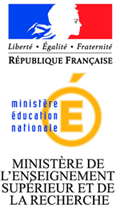 |
Ministère de l'Education Nationale The service des technologies et des systèmes d'information (STSI) is contributing to the widespread development of Teaching with Information and Communication Technology (ICT) across the board from the primary to the university sector. To promote its policy the Sub-Directorate of Information and Communication Technology in Education (SDICTE) is conducting operations that encourage inter-university networks to pool resources and develop a structured policy that has had a profound influence in the development of digital services offered to students. These actions have given rise to Thematic Digital Universities (TDUs) that put a range of validated pedagogical resources in different scientific disciplines at the disposal of students and teachers. Go to the site |
 |
Université Numérique Ingénierie et Technologie Université Numérique Ingénierie et Technologie (UNIT) is one of the National Thematic Digital Universities (TDUs) created on initiative of the Sub-Directorate of Information and Communication Technology in Education (SDICTE) of the Ministry for Higher Education and the Ministry of National Education UNIT brings together the public and private partners involved in higher education in Engineering and Technology who wish to pool existing digital resources, tools and experience and who wish to co-pilot projects in Teaching with Information and Communication Technology (ICT). UNIT is a voluntary association regulated by the law of 1901 that incorporates some fifty Universities and Grandes Ecoles of Engineering. Go to the site |
 |
Région Pays de la Loire The Pays de la Loire regional council/ Region strongly supports investment in the development of digital services and resources in universites and higher education establishments. It supports Thematic Digital University projects coordinated by establishments based in Pays de la Loire and supports international development of the Optique pour Ingénieurs [OPI] projects. Go to the site |
 |
Université du Maine Over the last seven years Université du Maine has been committed to the development of Teaching with Information and Communication Technology tools. A pioneering establishment in this domain, the University promotes the use of ICT and is involved in the development of digital services for all. In order to contribute to the pooling of digital resources, the dissemination of best practices and the standardization of information used in Teaching with Information and Communication Technology, Université du Maine is heavily involved regional and national partnerships and schemes. This resolute policy has resulted in active participation in several Thematic Digital Universities (UNTs): UNIT (Université numérique ingénierie et technologie); UVED (Université numérique thématique environnement et développement durable) and UNISCIEL (Université des sciences en ligne) and to support national projects piloted by establishments within this framework. Go to the site |
 |
Société Française d'Optique The mission of the Société Française d'Optique (SFO) is to promote closer links and collaboration between all parties involved in optics and optoelectronics and to foment actions undertaken to further human knowledge. One of the main objectives of the teaching committee of the SFO is to create a community of optics teachers to pool resources, knowledge and skills. The SFO fully supports the OPI project which contributes to the dissemination of knowledge of great scientific value in optics and the pooling of resources by teachers in this field. Go to the site |
 |
Club CMOI The club SFO/CMOI was created in 1999 at the initiative / under the driving force of the Scientific Committee of the Holography Club and the Administration Board/Board of Directors of the SFO. The mission of the Club is to encourage, in all appropriate forms, the exchange between research and industry of scientific and technical knowledge to facilitate industrial applications in all domains where optical control and measurement are or may be used. This includes non-destructive testing, movement detection sensors, speed sensors, deformation sensors, constraint sensors, and macroscopic and microscopic sensors. Go to the site |


